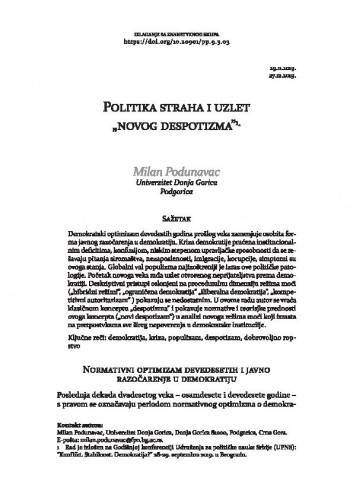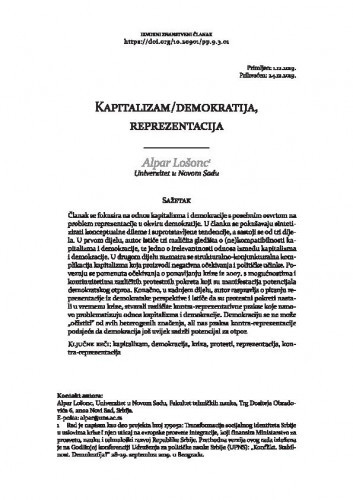Demokratski optimizam devedestih godina prošlog veka zamenjuje osobita forma javnog razočarenja u demokratiju. Kriza demokratije praćena institucionalnim deficitima, konfuzijom, niskim stepenom upravljačke sposobnosti da se rešavaju pitanja siromaštva, nezaposlenosti, imigracije, korupcije, simptomi su ovoga stanja. Globalni val populizma najizoštreniji je izraz ove političke patologije. Početak novoga veka rađa uzlet otvorenog neprijateljstva prema demokratiji. Deskriptivni pristupi oslonjeni na proceduralnu dimenziju režima moći („hibridni režimi“, „ograničena demokratija“ „iliberalna demokratija“, „kompetitivni autoritarizam“ ) pokazuju se nedostatnim. U ovome radu autor se vraća klasičnom konceptu „despotizma“ i pokazuje normative i teorisjke prednosti ovoga koncepta („novi despotizam“) u analizi novoga režima moći koji izrasta na pretpostvkama sve šireg nepoverenja u demokratske instituciije.; The democratic optimism of the 1990s has been replaced by a particular form of public disillusionment with democracy. The crisis of democracy, accompanied by institutional deficits, confusion, low levels of management capacity to tackle poverty, unemployment, immigration, corruption, are symptoms of this condition. The global wave of populism is the sharpest expression of this political pathology. The beginning of the new century has given birth to an open hostility to democracy. Descriptive approaches based on the procedural dimension of the regime of power ("hybrid regimes", "limited democracy", "liberal democracy", "competitive authoritarianism") are proving insufficient to capture the new political system. In this paper, the author returns to the classical concept of "despotism" and shows the normative and theoretical advantages of this concept ("new despotism") in the analysis of a new regime of power that grows on the premise of growing distrust of democratic institutions.
Sažetak

 Političke perspektive : časopis za istraživanje politike : 9, 3 (2019) / glavna urednica Ana Matan.
Političke perspektive : časopis za istraživanje politike : 9, 3 (2019) / glavna urednica Ana Matan.